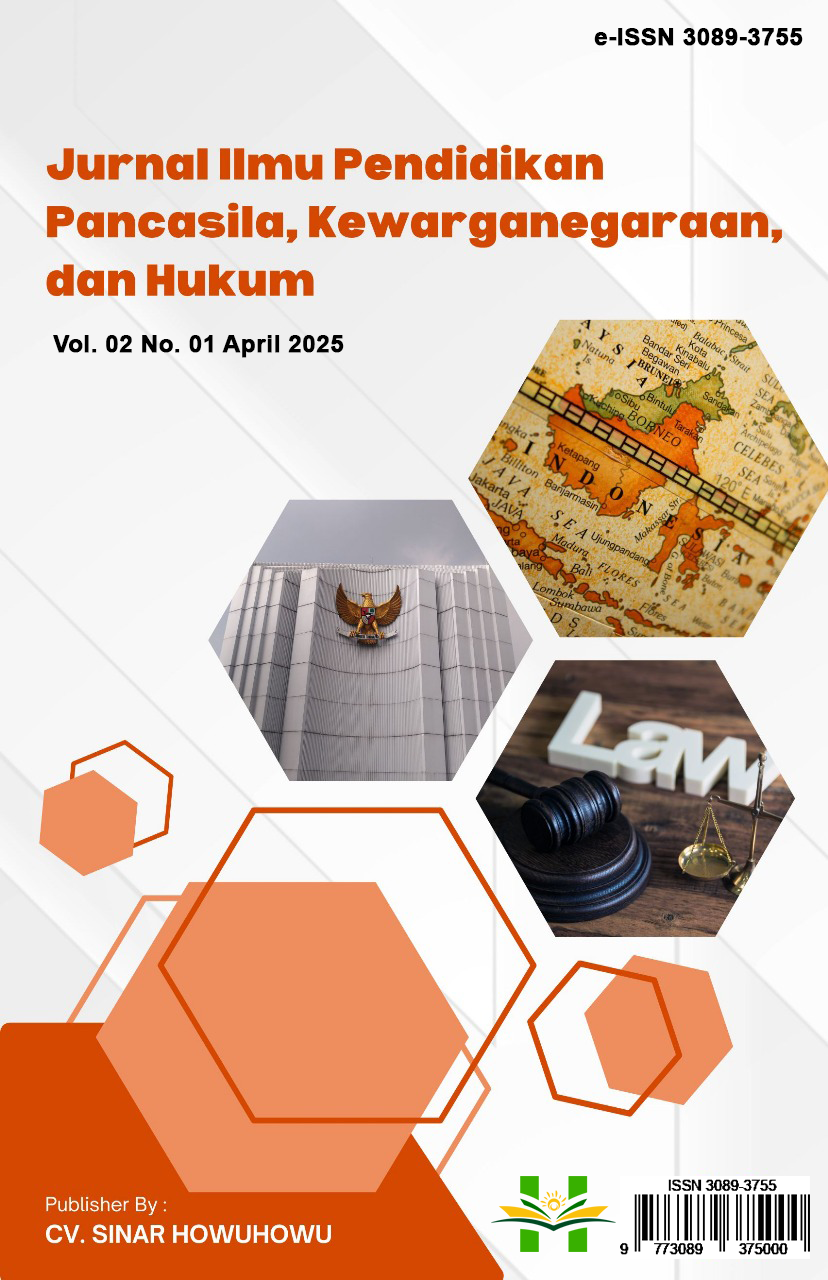Pemahaman Hak Dan Kewajiban Warga Negara Sebagai Pilar Penguatan Karakter Bangsa
DOI:
https://doi.org/10.70134/pakehum.v2i1.340Keywords:
rights and obligations, civic education, national character, public understanding, character strengtheningAbstract
This study aims to explore the understanding of Indonesian citizens regarding their rights and obligations as pillars for strengthening national character. A descriptive qualitative approach was used, with data collection techniques including in-depth interviews, focus group discussions (FGD), and observations in several locations across Indonesia. The results show that the public has a better understanding of their rights compared to their obligations. Urban communities tend to be more aware of their rights, while rural communities focus more on their obligations. However, both groups still lack understanding of the relationship between rights and obligations, which should complement each other. This study recommends improving the quality of civic education with a more practical and experiential approach, as well as the need for teacher training to deliver more engaging and contextual material. The findings are expected to contribute to the development of more effective civic education policies in Indonesia.
Downloads
References
Anderson, C. (2014). The role of civic education in strengthening democracy. Journal of Political Science, 58(2), 234-256.
Bell, D. (2010). The civic engagement gap: A study of the role of education in youth participation. Education and Democracy, 22(1), 45-60.
Boudah, D. (2015). Civic education and the development of democratic citizenship. Political Education Review, 35(3), 198-210.
Dewey, J. (1916). Democracy and education: An introduction to the philosophy of education. Macmillan.
Fauzi, M. (2018). Pendidikan kewarganegaraan dalam membentuk karakter bangsa. Jurnal Pendidikan dan Sosial, 21(4), 89-102.
Gagnon, P. (2016). Civic education and national identity: Exploring the connection between education and citizenship. Journal of Educational Policy, 44(2), 133-150.
Greenstein, F. (2001). The developing role of civic education in contemporary society. Educational Theory, 51(4), 411-423.
Hedges, E., & Dunn, L. (2019). Rights and obligations in democratic societies: A comparative analysis of civic education. International Journal of Civic Engagement, 33(1), 76-89.
Iskandar, A. (2017). Peran pendidikan kewarganegaraan dalam menguatkan karakter bangsa Indonesia. Jurnal Ilmu Sosial dan Humaniora, 19(2), 45-59.
Jones, J. (2015). The evolution of civic education and its role in shaping democratic societies. Journal of Political Education, 40(1), 22-40.
Kymlicka, W. (2007). Multicultural citizenship: A liberal theory of minority rights. Oxford University Press.
Lippmann, W. (1925). The phantom public. Harcourt, Brace and Company.
Mill, J. S. (1859). On liberty. John W. Parker and Son.
Muhammad, A. (2020). Pendidikan karakter dalam perspektif kewarganegaraan. Jurnal Pendidikan Indonesia, 27(1), 60-72.
Nussbaum, M. (2010). Not for profit: Why democracy needs the humanities. Princeton University Press.
Piaget, J. (1970). The science of education and the psychology of the child. Viking Press.
Putnam, R. D. (2000). Bowling alone: The collapse and revival of American community. Simon & Schuster.
Rawls, J. (1971). A theory of justice. Harvard University Press.
Rusmanto, F. (2018). Analisis pendidikan kewarganegaraan dalam memperkuat karakter bangsa. Jurnal Pendidikan dan Pembangunan, 18(3), 234-247.
Sahlberg, P. (2011). Finnish lessons: What can the world learn from educational change in Finland? Teachers College Press.
Santosa, H. (2017). Hak dan kewajiban dalam perspektif pendidikan kewarganegaraan. Jurnal Pendidikan Sosial, 16(2), 92-103.
Schapiro, S. (2003). Rights and duties in the modern state: A study in political theory. Oxford University Press.
Sen, A. (2009). The idea of justice. Belknap Press.
Smith, M. K. (2016). John Dewey and education: Democracy and the experience of learning. The Encyclopedia of Informal Education.
Stoker, G. (2006). Public participation in governance. Public Administration Review, 66(3), 457-468.
Tocqueville, A. de (1835). Democracy in America. Alfred A. Knopf.
Turner, B. S. (2006). Citizenship studies: A discipline and its contradictions. Citizenship Studies, 10(2), 125-141.
Walzer, M. (1983). Spheres of justice: A defense of pluralism and equality. Basic Books.
Wibowo, R. (2019). Pendidikan kewarganegaraan dalam pembentukan karakter bangsa di sekolah-sekolah Indonesia. Jurnal Pendidikan Kewarganegaraan, 24(1), 77-88.
Yilmaz, K. (2017). Civic education in the 21st century: The role of democratic values in education. Journal of Social Sciences, 48(4), 322-337.
Downloads
Published
Issue
Section
License
Copyright (c) 2025 Meliwati (Author)

This work is licensed under a Creative Commons Attribution-ShareAlike 4.0 International License.













